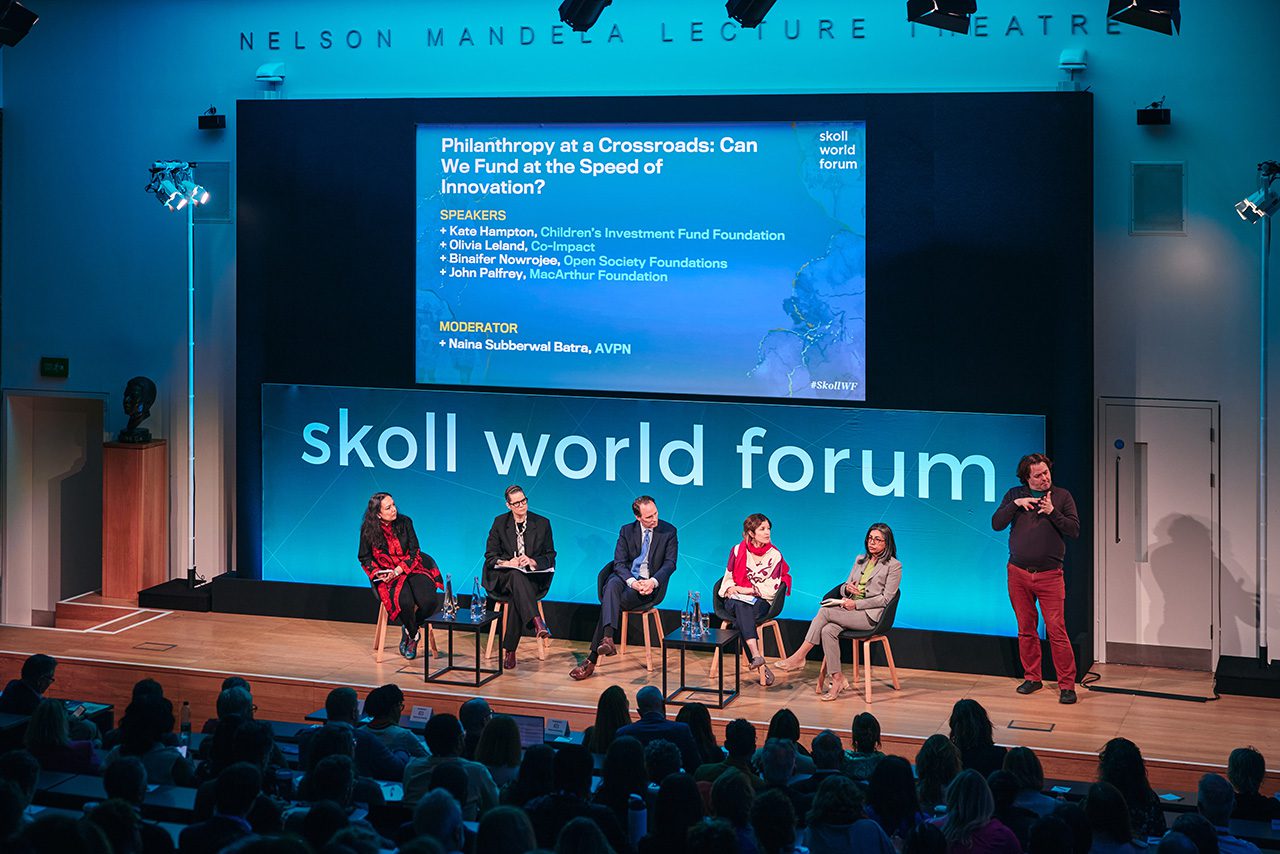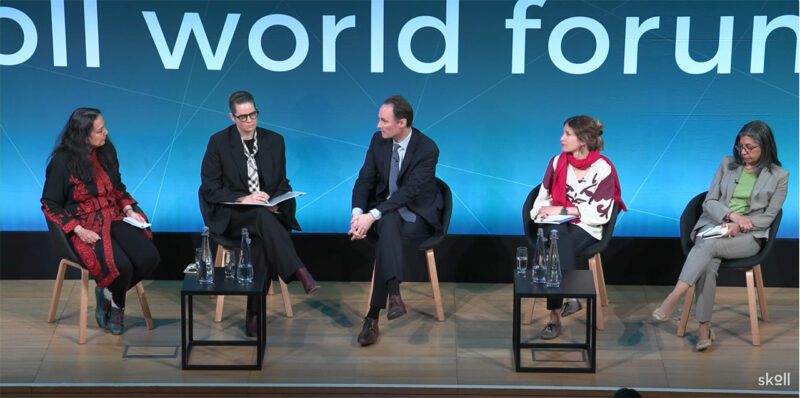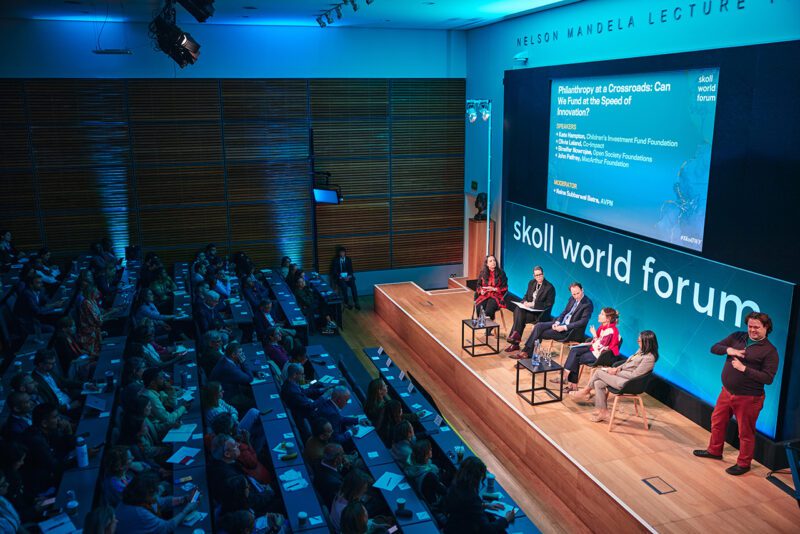Philanthropy at a Crossroads
Can we fund at the speed of innovation?
Can we fund at the speed of innovation?

Last month at the Skoll World Forum, global philanthropic leaders and innovators gathered for what felt less like a panel discussion and more like a wake-up call. As crises converge — from climate collapse and democratic backsliding to widening inequality — the question loomed large: can philanthropy evolve fast enough to meet the urgency of today’s interconnected challenges?
One message rang clear: incrementalism is no longer sufficient. While bold commitments were voiced, only time will tell whether they translate into transformative action.
John Palfrey of the MacArthur Foundation set the tone with a simple directive: “Anyone who has the ability should do more.” This wasn’t just aspirational talk — it was backed by action. MacArthur recently raised its annual payout from 5% to 6%, a move unanimously approved internally. The decision came in the context of major shifts in the global aid landscape, including the dismantling — or restructuring — of USAID. Other foundations have since followed suit with increased commitments.
But Palfrey was clear: this should be seen as a floor, not a ceiling. His call to philanthropy was unambiguous: open the wallets, remove unnecessary restrictions, and most importantly — stop saying no.

The MacArthur Fellows program exemplifies what long-term, risk-tolerant philanthropy can look like: $800,000 in unrestricted funding over five years, awarded to more than 1,100 individuals since the program’s launch. If today’s crises are historic in scale, then philanthropy’s response must be equally bold.
Olivia Leland of Co-Impact urged the conversation to go beyond percentages and payout rates. “Where is our moral imagination?” she asked, challenging philanthropy not just to give more — but to give differently. Rather than prescribing solutions from a distance, Leland emphasized the need to center those closest to the problems and to recognize emerging leaders who are reimagining systems from the ground up.
The age of top-down, conditional funding, she argued, must give way to trust-based philanthropy — one that embraces risk, honors complexity, and listens before leading.
His call to philanthropy was unambiguous: open the wallets, remove unnecessary restrictions, and most importantly — stop saying no.
Binaifer Nowrojee, President of Open Society Foundations (OSF), emphasized the human rights stakes of this philanthropic shift. “An open society is one where we all flourish,” she reminded the audience. But flourishing, she warned, is not guaranteed. It requires vigilance — especially as more countries slide into authoritarianism and civil tensions erupt into conflict.
OSF’s mandate is to support the courageous voices still fighting for rights in increasingly repressive environments. Yet Nowrojee posed a sobering question: What happens when traditional models of organizing no longer apply? Many of today’s most critical actors are unregistered or operate informally, out of necessity. Philanthropy must find new ways to support them — without forcing them to fit outdated molds.

She also took aim at conventional impact measurement frameworks. “What we work in is an art form,” she said. For work in human rights, journalism, or grassroots movements, standardized metrics often obscure more than they reveal. If philanthropy truly seeks to be catalytic, it must stop imposing rigid measurement tools on movements that thrive in messier, more emergent realities.
Kate Hampton, CEO of the Children’s Investment Fund Foundation (CIFF), spotlighted a frequently overlooked yet essential role for philanthropy: funding advocacy. It’s not enough to support service delivery, she argued — philanthropy must also invest in the policy change and systemic transformation that enable lasting impact.
For work in human rights, journalism, or grassroots movements, standardized metrics often obscure more than they reveal.
Advocacy takes many forms, from public protest to technical lobbying to strategic communications. But Hampton noted a persistent imbalance: who gets to advocate. Too often, Western development NGOs dominate the conversation, sidelining perspectives from the Global South. If we are serious about building a just and equitable future, she urged, philanthropy must do more than broaden its reach — it must shift the center of gravity.
Naina Subberwal of AVPN reminded the audience that philanthropy and civil society must be united in their willingness to take risks. As governments clamp down on activism and civic space continues to shrink, funders cannot retreat into caution. Instead, they must be ready to support organizations that operate beyond traditional structures—those navigating uncertainty, contesting power, and forging new models of change.
The world’s crises are not waiting for funders to gradually shift their strategies — they demand an immediate and radical response.
This is not the moment for restraint. It is a moment that demands courage.
Philanthropy stands at a crossroads. The world’s crises are not waiting for funders to gradually shift their strategies — they demand an immediate and radical response. The leaders in this conversation issued a clear mandate:
As John Palfrey put it: “Whatever it is — do more, give more.”
This is a moment of both opportunity and obligation. The question is no longer whether philanthropy can fund at the speed of innovation, but whether it is willing to act with the urgency this moment demands.
Related Content
Comments
Deep Dives
RECENT
Editor's Picks
Webinars
News & Events
Subscribe to our newsletter to receive updates about new Magazine content and upcoming webinars, deep dives, and events.
Become a Premium Member to access the full library of webinars and deep dives, exclusive membership portal, member directory, message board, and curated live chats.
At Impact Entrepreneur, we champion fearless, independent journalism and education, spotlighting the inspiring changemakers building the Impact Economy. Diversity, equity, sustainability, and democracy face unprecedented threats from misinformation, powerful interests, and systemic inequities.
We believe a sustainable and equitable future is possible—but we can't achieve it without your help. Our independent voice depends entirely on support from changemakers like you.
Please step up today. Your donation—no matter the size—ensures we continue delivering impactful journalism and education that push boundaries and hold power accountable.
Join us in protecting what truly matters. It only takes a minute to make a real difference.
0 Comments